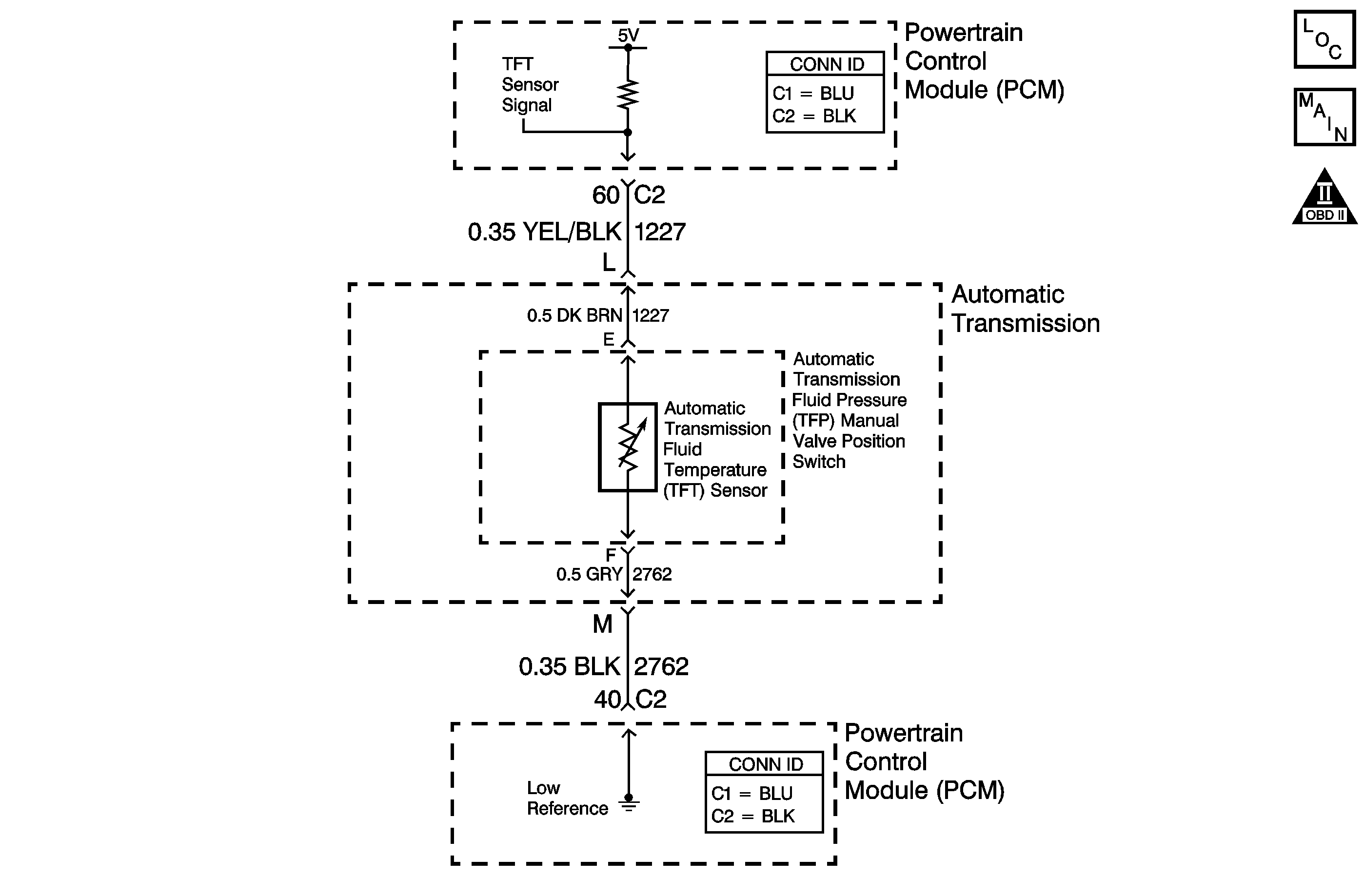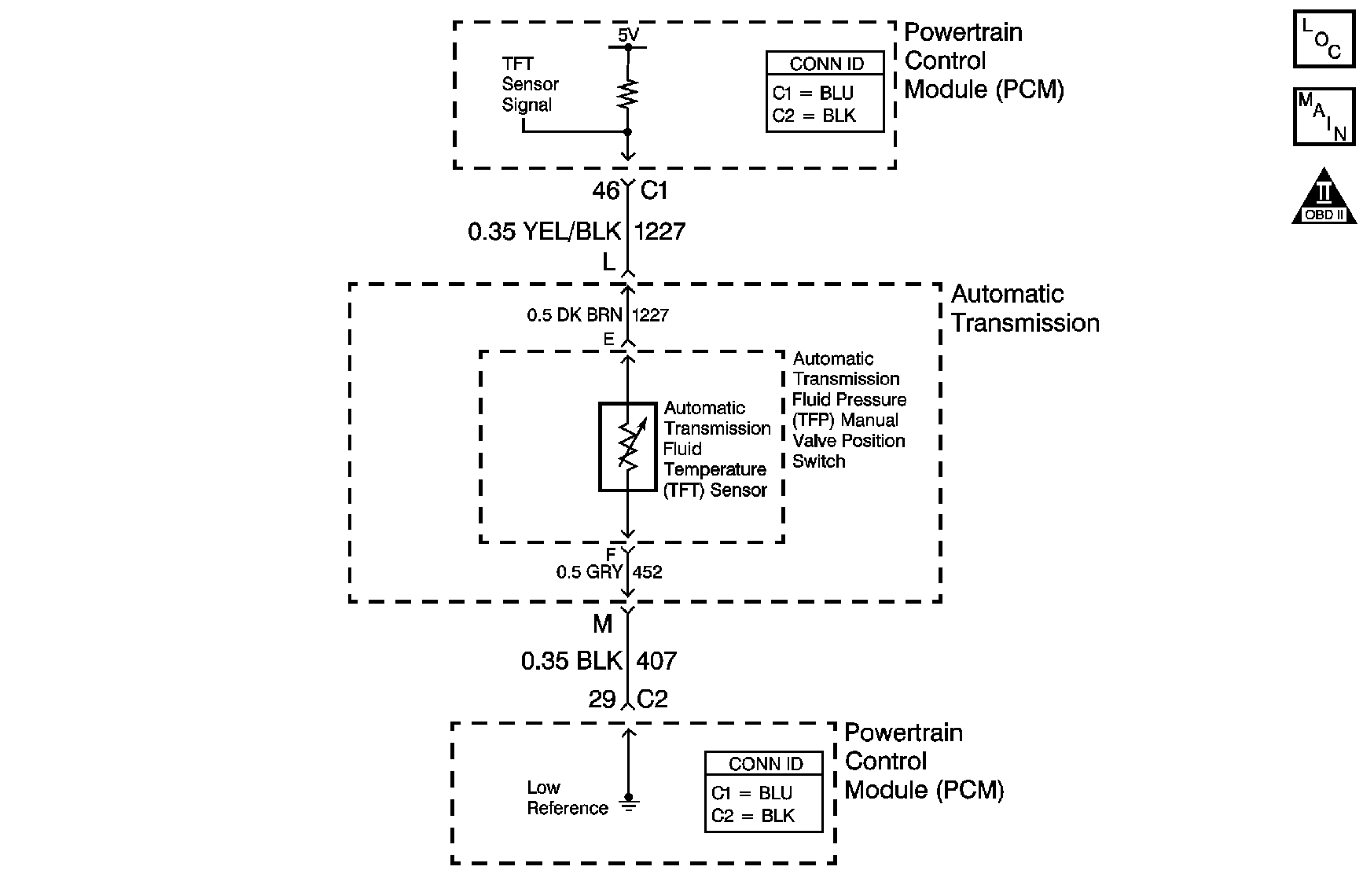DTC P0711 2.2L

Circuit Description
The automatic transmission fluid temperature (TFT) sensor is a negative coefficient thermistor. When the transmission fluid is cold, the sensor resistance is high. As the transmission fluid warms, the sensor resistance decreases. This diagnostic monitors the TFT circuit. The circuit may be functional, but not in the normal operating range. This diagnostic indicates stuck, erratic, intermittent, or skewed values, indicating poor system performance. The TFT range is -40 to +151°C (-40 to +305°F).
When the PCM detects an intermittent voltage or no voltage change in the TFT sensor circuit, then DTC P0711 sets. DTC P0711 is a type C DTC.
Conditions for Running the DTC
| • | No VSS DTCs P0502 or P0503. |
| • | No AT ISS DTCs P0716 or P0717. |
| • | The system voltage is 8-18 volts. |
| • | The engine run time is greater than 5 minutes. |
| • | The engine coolant temperature is greater than 70°C (158°F). |
| • | The engine coolant temperature has changed by greater than 50°C (90°F) since start-up. |
| • | The transmission fluid temperature at start-up is -40 to +21°C (-40 to +70°F). |
| • | The vehicle speed is greater than 8 km/h (5 mph) for 15 minutes cumulatively. |
| • | The TCC slip is greater than 120 RPM for 6 minutes and 49 seconds cumulatively. |
Conditions for Setting the DTC
One of the following conditions occurs:
Condition 1
The change in transmission fluid temperature is less than 2.25°C (4°F) since start-up for 1 minute and 20 seconds.
Condition 2
The change in transmission fluid temperature is greater than 20°C (36°F) within 200 milliseconds; 15 times within 7 seconds.
Action Taken When the DTC Sets
| • | The PCM does not illuminate the malfunction indicator lamp (MIL). |
| • | The PCM freezes transmission adapt functions. |
| • | The PCM calculates a default transmission fluid temperature based on engine coolant temperature, manifold air temperature, and engine run time. |
| • | The PCM records the operating conditions when the Conditions for setting the DTC are met. The PCM stores this information as Failure Records. |
| • | The PCM stores DTC P0711 in PCM history. |
Conditions for Clearing the DTC
| • | A scan tool can clear the DTC. |
| • | The PCM clears the DTC from PCM history if the vehicle completes 40 warm-up cycles without a non-emission related diagnostic fault occurring. |
| • | The PCM cancels the DTC default actions when the fault no longer exists and the DTC passes. |
Test Description
The numbers below refer to the step numbers on the diagnostic table.
-
This step tests for an intermittent short or open condition in the engine wiring harness. The test light is used as a resistor in the circuit.
-
This step determines if the PCM or the TFT sensor is causing a steady, unchanging TFT reading.
Step | Action | Value(s) | Yes | No | ||||
|---|---|---|---|---|---|---|---|---|
1 | Did you perform the Powertrain Diagnostic System Check? | -- | Go to Step 2 | Go to Diagnostic System Check - Engine Controls in Engine Controls - 2.2L (L61) or Diagnostic System Check - Engine Controls in Engine Controls - 2.2L (LN2) | ||||
2 | Did you perform the Transmission Fluid Checking Procedure? | -- | Go to Step 3 | Go to Transmission Fluid Check | ||||
3 |
Important: Before clearing the DTC, use the scan tool in order to record the Failure Records. Using the Clear Info function erases the Failure Records from the PCM.
Did either of the fail conditions occur? | -- | Go to Step 4 | Go to Intermittent Conditions in Engine Controls - 2.2L (L61) or Intermittent Conditions in Engine Controls - 2.2L (LN2) | ||||
4 | Did the scan tool display a condition in which the TFT does not change by greater than the specified value in 20 seconds since startup? | 2.25°C (4°F) | Go to Step 6 | Go to Step 5 | ||||
Refer to Automatic Transmission Inline Harness Connector End View . Does the TFT change by greater than the specified value? | 20°C (36°F) | Go to Step 7 | Go to Step 8 | |||||
Did the scan tool display a condition in which the TFT does not change by greater than the specified value in 20 seconds since startup? | 1.5°C (2.7°F) | Go to Step 11 | Go to Step 10 | |||||
7 |
Refer to Circuit Testing and Wiring Repairs in Wiring Systems. Did you find and correct a condition? | -- | Go to Step 12 | Go to Step 11 | ||||
8 |
Refer to Circuit Testing and Wiring Repairs in Wiring Systems Did you find a condition? | -- | Go to Step 9 | Go to Step 10 | ||||
9 | Replace the automatic transmission wiring harness. Refer to Transmission Overhaul in Transmission Unit Repair Manual. Did you complete the replacement? | -- | Go to Step 12 | -- | ||||
10 | Replace the TFT sensor. This is part of the TFP manual valve position switch. Refer to Pressure Switch Assembly Replacement. Did you complete the replacement? | -- | Go to Step 12 | -- | ||||
11 | Replace the PCM. Refer to Powertrain Control Module Replacement in Engine Controls - 2.2L (L61) or Powertrain Control Module Replacement in Engine Controls - 2.2L (LN2). Did you complete the replacement? | -- | Go to Step 12 | -- | ||||
12 | Perform the following procedure in order to verify the repair:
Has the test run and passed? | -- | System OK | Go to Step 1 |
DTC P0711 2.4L

Circuit Description
The automatic transmission fluid temperature (TFT) sensor is a negative coefficient thermistor. When the transmission fluid is cold, the sensor resistance is high. As the transmission fluid warms, the sensor resistance decreases. This diagnostic monitors the TFT circuit. The circuit may be functional, but not in the normal operating range. This diagnostic indicates stuck, erratic, intermittent, or skewed values, indicating poor system performance. The TFT range is -40 to +151°C (-40 to +305°F).
When the PCM detects an intermittent voltage or no voltage change in the TFT sensor circuit, then DTC P0711 sets. DTC P0711 is a type C DTC.
Conditions for Running the DTC
| • | No VSS DTCs P0502 or P0503. |
| • | No AT ISS DTCs P0716 or P0717. |
| • | The system voltage is 8-18 volts. |
| • | The engine run time is greater than 5 minutes. |
| • | The engine coolant temperature is greater than 70°C (158°F). |
| • | The engine coolant temperature has changed by greater than 50°C (90°F) since start-up. |
| • | The transmission fluid temperature at start-up is -40 to +21°C (-40 to +70°F). |
| • | The vehicle speed is greater than 8 km/h (5 mph) for 6 minutes and 49 seconds cumulatively. |
| • | The TCC slip is greater than 120 RPM for 6 minutes and 49 seconds cumulatively. |
Conditions for Setting the DTC
One of the following conditions occurs:
Condition 1
The change in transmission fluid temperature is less than 2.25°C (4°F) since start-up for 1 minute and 20 seconds.
Condition 2
The change in transmission fluid temperature is greater than 20°C (36°F) within 200 milliseconds; 15 times within 7 seconds.
Action Taken When the DTC Sets
| • | The PCM does not illuminate the malfunction indicator lamp (MIL). |
| • | The PCM freezes transmission adapt functions. |
| • | The PCM calculates a default transmission fluid temperature based on engine coolant temperature, manifold air temperature, and engine run time. |
| • | The PCM records the operating conditions when the Conditions for setting the DTC are met. The PCM stores this information as Failure Records. |
| • | The PCM stores DTC P0711 in PCM history. |
Conditions for Clearing the DTC
| • | A scan tool can clear the DTC. |
| • | The PCM clears the DTC from PCM history if the vehicle completes 40 warm-up cycles without a non-emission related diagnostic fault occurring. |
| • | The PCM cancels the DTC default actions when the fault no longer exists and the DTC passes. |
Test Description
The numbers below refer to the step numbers on the diagnostic table.
-
This step tests for an intermittent short or open condition in the engine wiring harness. The test light is used as a resistor in the circuit.
-
This step determines if the PCM or the TFT sensor is causing a steady, unchanging TFT reading.
Step | Action | Value(s) | Yes | No | ||||
|---|---|---|---|---|---|---|---|---|
1 | Did you perform the Powertrain Diagnostic System Check? | -- | Go to Step 2 | Go to Diagnostic System Check - Engine Controls in Engine Controls - 2.4L | ||||
2 | Did you perform the Transmission Fluid Checking Procedure? | -- | Go to Step 3 | Go to Transmission Fluid Check | ||||
3 |
Important: Before clearing the DTC, use the scan tool in order to record the Failure Records. Using the Clear Info function erases the Failure Records from the PCM.
Did either of the fail conditions occur? | -- | Go to Step 4 | Go to Intermittent Conditions in Engine Controls - 2.4L | ||||
4 | Did the scan tool display a condition in which the TFT does not change by greater than the specified value in 20 seconds since startup? | 1.5°C (2.7°F) | Go to Step 6 | Go to Step 5 | ||||
Refer to Automatic Transmission Inline Harness Connector End View . Does the TFT change by greater than the specified value? | 20°C (36°F) | Go to Step 7 | Go to Step 8 | |||||
Did the scan tool display a condition in which the TFT does not change by greater than the specified value in 20 seconds since startup? | 1.5°C (2.7°F) | Go to Step 11 | Go to Step 10 | |||||
7 |
Refer to Circuit Testing and Wiring Repairs in Wiring Systems. Did you find and correct a condition? | -- | Go to Step 12 | Go to Step 11 | ||||
8 |
Refer to Circuit Testing and Wiring Repairs in Wiring Systems Did you find a condition? | -- | Go to Step 9 | Go to Step 10 | ||||
9 | Replace the automatic transmission wiring harness. Refer to Wiring Harness Replacement . Did you complete the replacement? | -- | Go to Step 12 | -- | ||||
10 | Replace the TFT sensor. This is part of the TFP manual valve position switch. Refer to Transmission Fluid Pressure Manual Valve Position Switch Replacement . Did you complete the replacement? | -- | Go to Step 12 | -- | ||||
11 | Replace the PCM. Refer to Powertrain Control Module Replacement in Engine Controls - 2.4L. Did you complete the replacement? | -- | Go to Step 12 | -- | ||||
12 | Perform the following procedure in order to verify the repair:
Has the test run and passed? | -- | System OK | Go to Step 1 |
